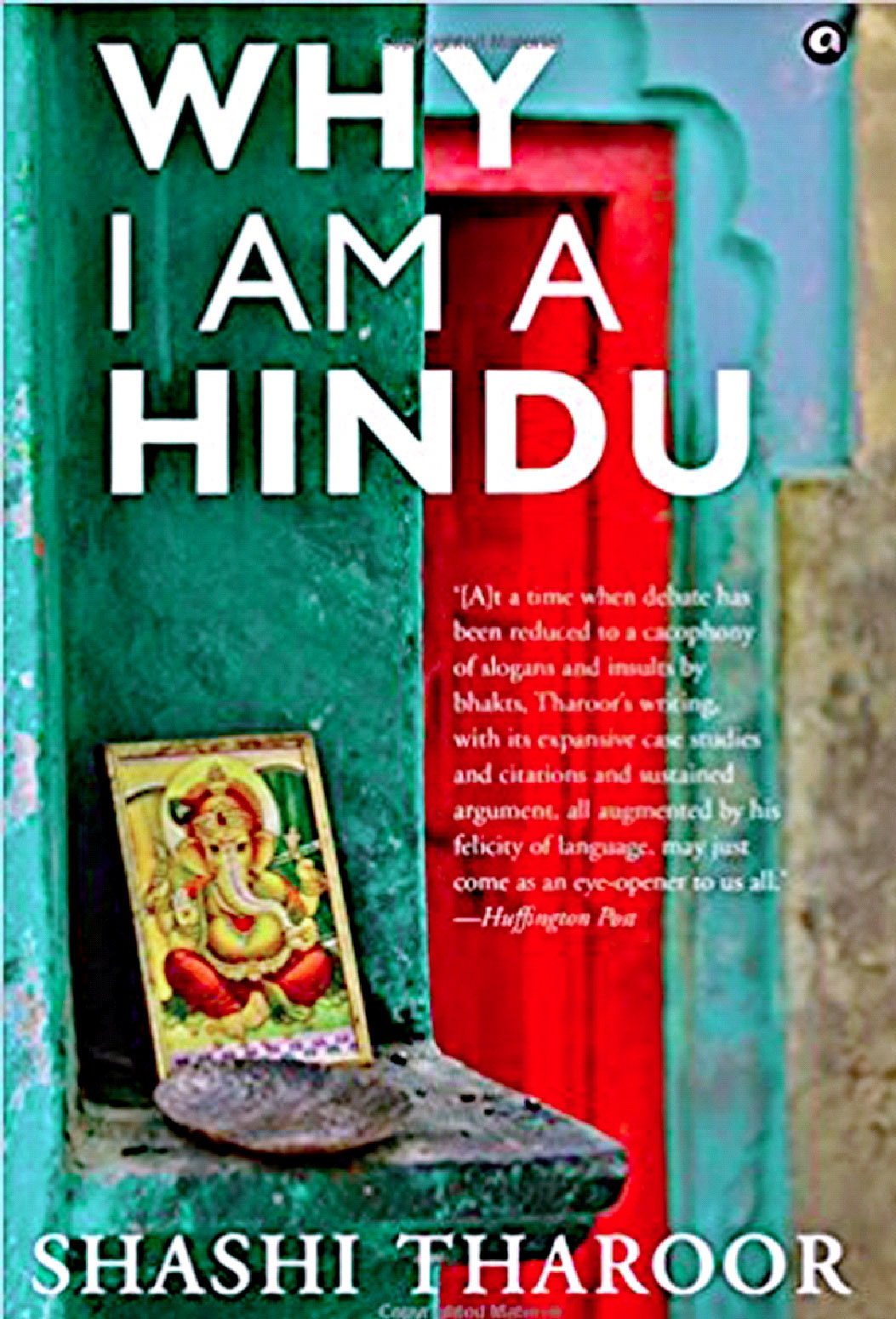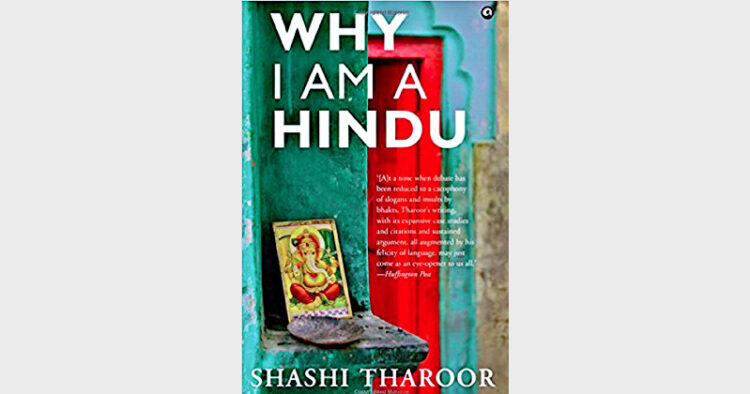 Tharoor’s Why I am a Hindu attempts to discredit other Hindu groups and essentially divide the Hindus and make them more vulnerable to electoral manipulation and outside domination
Tharoor’s Why I am a Hindu attempts to discredit other Hindu groups and essentially divide the Hindus and make them more vulnerable to electoral manipulation and outside domination
David Frawley
As a western Hindu who has been writing on Hindu Dharma for more than forty years, the idea of a book called Why I am a Hindu written by a prominent Indian intellectual and political leader, is something that I would certainly look forward to. At last a defence of Hindu Dharma from a person of India’s political and intellectual elite, one would hope!
Yet examining Shashi Tharoor’s book has proved to be a sad disappointment, finding not a spirited defence of Hinduism but a continued scaling down of Hinduism to fit western biases, personal opinions and anti-Hindu political
compulsions. The book is at best a compromised presentation of Hindu Dharma reflecting a narrow political agenda, not a clear presentation of this vast and profound tradition of Self-realisation according to its own value.
Political Background and Release of the Book
Shashi Tharoor is perhaps the chief strategist of the Congress Party today and one of its key spokespersons and campaigners for a party that has usually looked at Hinduism in a negative light as an electoral threat. Prior to the release of his book, if one were to ask who were the most ardent defenders of Hinduism in India’s intellectual realm, the name Shashi Tharoor would likely not arise. In fact, one would likely place Tharoor among the anti-Hindu forces by the company he keeps and thinkers he defends. Tharoor is not someone who has written extensively on Hinduism or any branch of it like Yoga, Vedanta or Vedic Studies. The book is not an intellectual defense of Hinduism against the many hostile forces arrayed against it in this age of global communication and media wars. It is an attempt to discredit other Hindu groups and essentially divide the Hindus and make them more vulnerable to electoral manipulation and outside domination.
Shashi Tharoor has been privy to Congress propaganda of Hindu terror and Saffron terror. He has been happy to speak before evangelical Christian groups in Kerala overtly trying to convert Hindus. He has not opposed his party’s excusing of Jihadi terrorists like Afzal Guru, Burwan Wani or Ishrat Jahan. His party has allied often with Communists in Bengal, and he is friendly with Communists in Kerala who are responsible for the murders of a number of Hindu activists. His party commissioned Communist scholars to write the textbooks about ancient India in which Hinduism and the Vedas are put in a very
poor light.
Tharoor’s book is not a confession of faith, a homage to India’s great gurus, an elaboration of Hindus powerful deity forms, a
lauding of the universal value of Hindu traditions, an exploration of deeper Yoga teachings, or even his own personal experience of Hindu Dharma. Though he does touch on these things in passing, it is part of a larger political agenda.
Attacking Hindutva as an Article of Faith
The second half of the book centres on attacking what Tharoor regards as negative Political Hinduism, criticising Hindutva and other “Holy Cows” as abuses of Hinduism. His anti-Hindutva tirades are a repeat of old leftist pseudo-secular attacks on Hindu groups in India, but with a new pretence of liberal Hinduism, as the secular card no longer works.
The book ends with a call for Taking Back Hinduism. I would certainly welcome taking Hinduism back from the distortions of Marxist and Freudian scholars, or religious groups identifying Yoga and Hinduism as dangerous or the work of devil. But who is Tharoor aiming at taking Hinduism back from? It is other Hindus who have arguably better represented Hindu Dharma in their behavior and their life-style – notably Hindus like Narendra Modi, the first Indian PM to sincerely honour Hindu Dharma both in the country and on the global stage. Tharoor is trying to discredit BJP and RSS as false Hindus, though they have more consistently endeavoured to support Hindu Dharma and its great teachings, and lived more austere lives than India’s anti-Hindu intellectuals.
The goal of the book is not to reveal the deeper truth of Hinduism but to divide the Hindu vote in India in favour of Congress, which it has recently lost, causing its defeat at the polls. The book, though called Why I am a Hindu, could perhaps be better titled Why I am against Hindutva. While Tharoor is against political Hinduism, his own party has promoted political Islam and political Christianity whose votes usually go in their favour.
The Congress Party and the Rahul Gandhi Remake
Tharoor has long been one of the main defenders of the Nehru dynasty and still looks up to the dynasty, not to democracy or any dharmic inspiration, to run the country. The book is connected to the political remake of Rahul Gandhi, current Congress Party president and dynasty prince, whose religious identity has long been in doubt. Tharoor has aided Rahul in his new image as a liberal Hindu leader, suddenly visiting temples in recent campaigns in a way that he never did in the past. This combination of Tharoor and Rahul Gandhi, with Rahul as the political face of liberal Hinduism and Tharoor as his high priest, is hardly a demonstration of Hindu faith, pride and resurgence. It is merely a recasting of the old secular anti-Hindu groups in a new Hindu image to remain relevant in an era in which their old strategy to discredit Hindu forces has failed. No doubt the book is being highlighted at Congress rallies today.
Vedic and Historical Issues
As a Vedic scholar I am particularly disappointed by Tharoor’s unwilling to emphasise the Sarasvati River and new archeological discoveries about ancient India that refute the old Aryan Invasion/Migration theory. He does not show any deep understanding of the Vedic mantras or Vedic rishis. His book reminds one of a new version of Nehru’s casual Discovery of India that uncritically relies on western thinkers, not the lion’s roar of Swami Vivekananda or Sri Aurobindo’s profound critiques of western civilisation. Tharoor has little to say about Vedic sciences like Ayurveda either. He seems to avoid any controversies that might praise Hindu teachings in a way that the western mind could object. In addition, he says little to connect Hinduism and Yoga and show their common values and background, much less to regard them as one.
While Tharoor writes against Hindu politics, he fails to understand the long history of Hindu kings including Rama, Krishna and Shivaji. The Hindu idea of a Kshatriya Dharma and the Bhagavad Gita is something he does not emphasize. His history of Hinduism downplays the destruction of thousands of Hindu temples. He does not support the effort to rebuild the Ram Temple in Ayodhya. On the contrary, Tharoor spends several pages defending the Mughal ruler Aurangzeb from charges of destruction of Hindu temples, forgetting Shivaji and the Maratha war against the tyrant. He seems to have more deference for Aurangzeb than for current Hindu leaders like Narendra Modi who he seeks to discredit.
Tharoor Questioning of My Views on Hinduism
Tharoor mentions my writings in a few places in his book, which I must appreciate, but ultimately rejects them as misleading. He quotes me, “Hindus are generally suffering from a lack of self-esteem and an inferiority complex by which they are afraid to really express themselves or their religion. They have been beaten down by centuries of foreign rule and ongoing attempts to convert them.” To this Tharoor replies, “Frawley’s answer is for Indians to reassert Hindu pride, but his diagnosis calls that prescription into question.” On the contrary, my diagnosis remains correct since I wrote these words in 1994. Are not the centuries of foreign rule and oppression a fact, along with massive conversion efforts that continue to the present day? Are not distortions of Hinduism still common in the media and academia, even in India?
Hindus have a great tradition to be proud of, just as India has a great dharmic civilisation with its own worldview. Tharoor shows that his regard for Hinduism is subordinated to his political constraints of defending the Nehru dynasty. That is not the resurgent Hindu Dharma needed today, which is to revive its vast tradition of great yogis and rishis going back to the Vedas and bring to the world its art and science of consciousness and Self-realisation.
Tharoor states, “I reject the presumption that the purveyors of hatred speak for all or even most Hindus.” To suggest that purveyors of hatred are prominent among Hindus is quite disingenuous. Hindus have no theology of conversion and conquest, have not invaded any country, and have demonstrated much more tolerance and much less hatred of others than those seeking to convert or conquer them. Hindus have not been the purveyors of hatred but the victims of it, extending to centuries of destruction of Hindu temples, killing of Hindu activists, and media denigrations of Hindu Dharma that we can find in the New York Times and other western liberal media outlets that Tharoor and his sons write for in order to attack Hindutva forces. I suppose Tharoor’s outrage against false Hindus might make more sense if he had a greater outrage against the ongoing assault on Hinduism by Marxist and conversion groups, for which he is largely silent, complacent and perhaps complicit.
Conclusion
In short, the book is more a call for Hindus to disarm themselves and go to sleep, so that the old anti-Hindu forces – now waving a banner that they are also Hindus – can continue to take advantage of them. It is hardly a clarion call for Hindus to awaken and spread their wonderful teachings for a new century. Tharoor is not the voice of resurgent Hinduism but of Hindu surrender, subordination and apologetics, much like Hindu retainers for older foreign rulers. His view of Hinduism is unlikely to inspire anyone to become a Hindu.
What is perhaps positive for Hindus is the book shows that for the Congress Party to survive it can no longer take the Hindu voice in India for granted. Yet instead of admitting the party’s errors in the past, Tharoor is trying to change the narrative so that these can be ignored. Hindus, though a majority, have long been discriminated against in India, whether by government control of temples and expropriation of their funds, court regulation and restriction of Hindu rituals and festivals, or media and academia anti-Hindu distortions. The Nehruvian elite has been behind most of these anti-Hindu agendas.
Hindu Dharma is not liberal or conservative in the western sense of these terms that such as Tharoor use. It follows an eternal Dharma and an understanding of cosmic consciousness far beyond western political or cultural compulsions, constrained in physical and material views of life.
This is the beauty of Hinduism that Tharoor does not seem to appreciate. He wants a Hindu Dharma that can be used in favor of leftist politics, which is how he is trying to redefine it. Coming from the West and knowing the limitations of western political thought, fortunately I don’t feel that compulsion, nor am I impressed by those who do.
It is a deeper consciousness that we need in the world today, such as is taught in the Hindu and Vedic tradition that remains alive and dynamic through its many great gurus and profound teachings which are now spreading globally.














Comments